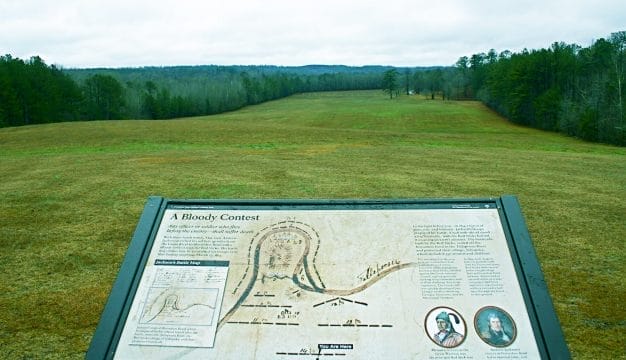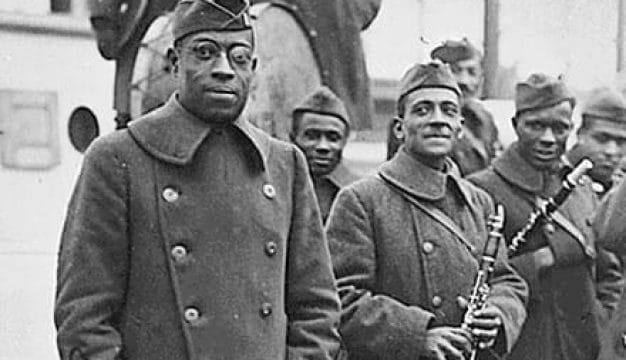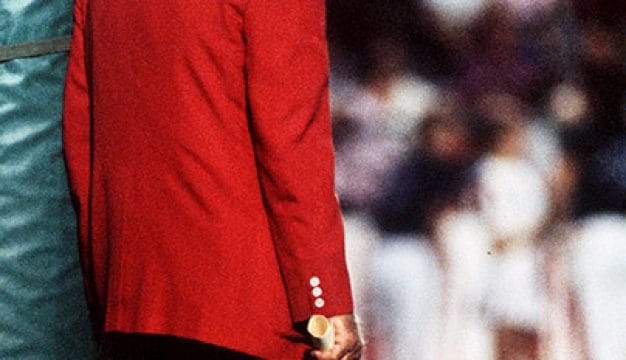Bass Anglers Sportsman Society
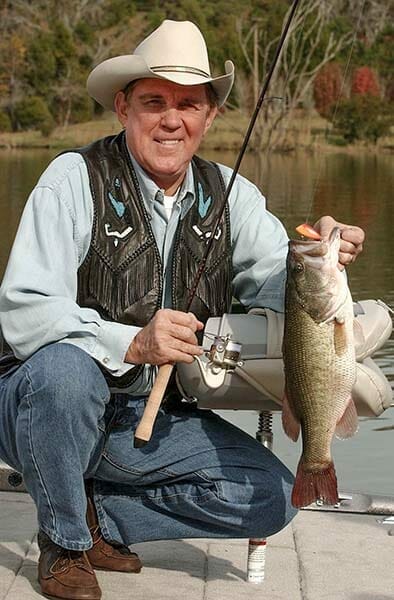 Ray Scott
The Bass Anglers Sportsman Society (B.A.S.S.), the world’s largest fishing organization, has transformed sport fishing into a multibillion-dollar industry while promoting safety and environmental responsibility. Founded by Ray Scott of Montgomery in the late 1960s, B.A.S.S. is currently owned by the ESPN television network and has grown and diversified to include fishing tournaments, magazines, websites, and television programs. It is headquartered in Birmingham, Jefferson County, and a partner in the Alabama Bass Trail.
Ray Scott
The Bass Anglers Sportsman Society (B.A.S.S.), the world’s largest fishing organization, has transformed sport fishing into a multibillion-dollar industry while promoting safety and environmental responsibility. Founded by Ray Scott of Montgomery in the late 1960s, B.A.S.S. is currently owned by the ESPN television network and has grown and diversified to include fishing tournaments, magazines, websites, and television programs. It is headquartered in Birmingham, Jefferson County, and a partner in the Alabama Bass Trail.
Ray Scott was a successful insurance salesman in March 1967 when he recognized the untapped market of competitive sport fishing. At that time some considered bass to be “trash” fish, with competitive bass fishing usually relegated to two-dollar-admission “derbies” run by local chambers of commerce. Lack of regulation of these events often resulted in cheating and last-minute rule changes, causing media to largely ignore the events. Scott aimed to change this perception as he organized the First All-American Invitational Bass Tournament in June 1967 at Beaver Lake in northwest Arkansas. Employing techniques he learned as an insurance salesman, Scott lured entrants with grandiose invitation letters. To legitimize the event, he drew up a strict set of rules and offered a first prize that included $2,000, an Acapulco vacation, and a lot on Beaver Lake. Prizes also were offered for the next nine finishers, which finally attracted 106 contestants hoping to finish at least tenth and recoup their $100 entry fee. Stan Sloan won with a catch of 37 pounds, 8 ounces. Although Scott actually lost $600 in the venture, he was encouraged to continue.
The second tournament took place on Smith Lake in Cullman County in October 1967, and the third was held at Lake Seminole in south Georgia the following February. Nashville Tennessean editor Bob Steber coined the acronymic name, and Scott began expanding B.A.S.S. to include touring fishing seminars to improve profitability and encourage membership. In 1968, Don Butler of Oklahoma became the first member of B.A.S.S., paying $100 for a life membership. In October 1969 B.A.S.S. was featured in Sports Illustrated, and in December Bob Cobb was hired to edit Bassmaster Magazine, which grew from the B.A.S.S. newsletter that Scott had been producing for members. Helen Sevier, a direct-mail marketing specialist, also was hired at this time after Montgomery civil rights attorney Morris Dees recommended her. Under her, B.A.S.S. membership climbed from 15,000 to 25,000 in one year and leapt to 65,000 in 1970. That same year, Harold Sharp was hired to organize Scott’s B.A.S.S. fishing seminar tours and eventually would become the B.A.S.S. tournament director.
In 1971, B.A.S.S. held its first Masters Classic at Lake Mead in Las Vegas, Nevada, bringing together the sport’s all-stars for an annual championship. The prestige of the Classic rose further when former president Jimmy Carter and test pilot Chuck Yeager attending the 1986 Classic in Chattanooga, Tennessee, (the first to be televised live nationally), and Vice President George Bush and then-Arkansas Gov. Bill Clinton attending the 1989 Classic in Pine Bluff, Arkansas. A significant milestone occurred in 1983 when Alfred Williams became the first African American to qualify for the Bassmaster Classic.
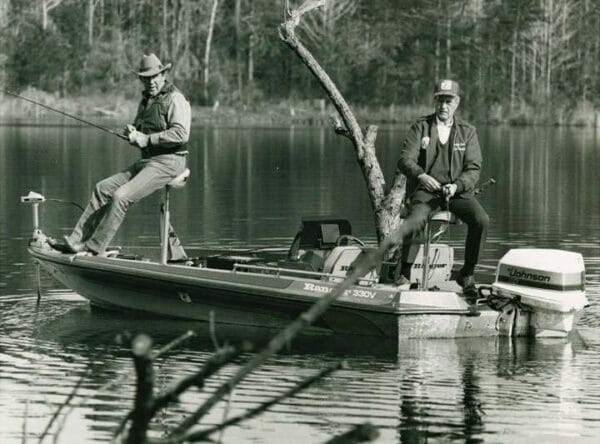 Ray Scott and Pres. George Bush Fishing
In addition to creating a successful business, Scott also pushed for boater safety measures, advocated for environmental issues, and encouraged legislation for boating certification and licensing. In 1968, Scott initiated a requirement that fastened life preservers to be worn in B.A.S.S. tournaments whenever outboard motors were running, and B.A.S.S angler Dave Hilton was the first to use an ignition kill switch that has since become standard on outboard motors. Scott worked to protect America’s waters, employing the Refuse Act of 1899, which prohibits all industrial discharges into the nation’s navigable waterways, in more than 200 lawsuits from 1970-71. Also, in 1994 Scott worked to help enact the nation’s first comprehensive Boating Safety Reform Act in Alabama. This law requires the mandatory certification of all boat operators through the successful completion of a written exam. Since the enactment of this law, deaths on Alabama‘s waterways have fallen by 50 percent. Perhaps Scott’s strongest impact on the sport of fishing has been the catch-and-release policy, which was not a common practice before he mandated it for B.A.S.S. competitions in 1972.
Ray Scott and Pres. George Bush Fishing
In addition to creating a successful business, Scott also pushed for boater safety measures, advocated for environmental issues, and encouraged legislation for boating certification and licensing. In 1968, Scott initiated a requirement that fastened life preservers to be worn in B.A.S.S. tournaments whenever outboard motors were running, and B.A.S.S angler Dave Hilton was the first to use an ignition kill switch that has since become standard on outboard motors. Scott worked to protect America’s waters, employing the Refuse Act of 1899, which prohibits all industrial discharges into the nation’s navigable waterways, in more than 200 lawsuits from 1970-71. Also, in 1994 Scott worked to help enact the nation’s first comprehensive Boating Safety Reform Act in Alabama. This law requires the mandatory certification of all boat operators through the successful completion of a written exam. Since the enactment of this law, deaths on Alabama‘s waterways have fallen by 50 percent. Perhaps Scott’s strongest impact on the sport of fishing has been the catch-and-release policy, which was not a common practice before he mandated it for B.A.S.S. competitions in 1972.
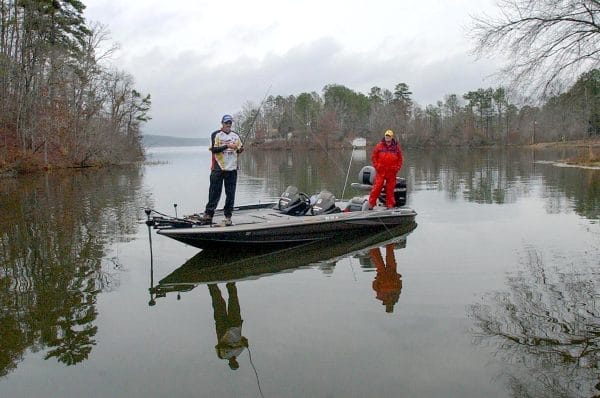 Lay Lake Fishing
B.A.S.S. expanded into television in 1985 when the Bassmaster television program debuted on The Nashville Network. The next year, Scott sold the company to Sevier and the Jemison Investment Company of Birmingham; he remained its spokesman until August 1998. Sports television network ESPN purchased B.A.S.S. in 2005 and created ESPN Outdoors around it, moving the headquarters to Celebration, Florida. Until his death on May 8, 2022, “Bass Boss,” Ray Scott contributed to Bassmaster Magazine, sat as chairman emeritus of B.A.S.S., and was considered the official spokesman of bass fishing. He received numerous awards for his work promoting outdoor sports and recreation. Today B.A.S.S. membership tops 500,000, and the sport’s popularity is still steady. The organization holds a number of tournaments per year and awards millions in prize money, including $300,000 for the top prize in the Classic. The B.A.S.S. Nation series of contests allow participants to compete on a local level with the chance to move up to the Classic. In 2002, B.A.S.S competitor Kevin VanDam won an ESPN Espy award for Best Outdoor Sports Athlete, the first angler to do so. In 2011, the organization returned to Alabama, establishing a headquarters in Birmingham.
Lay Lake Fishing
B.A.S.S. expanded into television in 1985 when the Bassmaster television program debuted on The Nashville Network. The next year, Scott sold the company to Sevier and the Jemison Investment Company of Birmingham; he remained its spokesman until August 1998. Sports television network ESPN purchased B.A.S.S. in 2005 and created ESPN Outdoors around it, moving the headquarters to Celebration, Florida. Until his death on May 8, 2022, “Bass Boss,” Ray Scott contributed to Bassmaster Magazine, sat as chairman emeritus of B.A.S.S., and was considered the official spokesman of bass fishing. He received numerous awards for his work promoting outdoor sports and recreation. Today B.A.S.S. membership tops 500,000, and the sport’s popularity is still steady. The organization holds a number of tournaments per year and awards millions in prize money, including $300,000 for the top prize in the Classic. The B.A.S.S. Nation series of contests allow participants to compete on a local level with the chance to move up to the Classic. In 2002, B.A.S.S competitor Kevin VanDam won an ESPN Espy award for Best Outdoor Sports Athlete, the first angler to do so. In 2011, the organization returned to Alabama, establishing a headquarters in Birmingham.
B.A.S.S. has a production subsidiary based in Little Rock, Arkansas, that oversees the creation of all of its broadcast content, including Bassmaster LIVE, a show on the Fox Network that follows top competitors in tournaments. And the organization maintains a broad presence on all social media platforms. Almost all sport fishing contests take their cue from the rules and structure laid down by Scott in his tournaments, and B.A.S.S. continues to shape and influence the world of outdoor sporting and recreation.
Further Reading
- Boyle, Robert H. Bass Boss: Inspiring Story of Ray Scott and the Sport Fishing Industry He Created. Pintlala, Ala.: Whitetail Trail Press, 1999.
- Scott, Ray. Prospecting and Selling: From a Fishing Hole to a Pot of Gold. R. Scott, (copyright) 1981.

